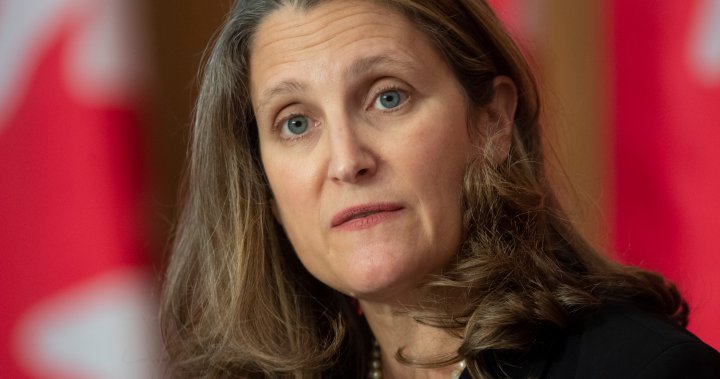Finance Minister Chrystia Freeland says the federal government is extending multiple COVID-19 benefits due to expire in September for an extra 30 days amid reopening delays and concerns about the spread of the Delta variant.
At a press conference on Friday, Freeland announced the wage subsidy and the rent subsidy are being extended, as are the Canada Recovery Benefit, the Canada Recovery Caregiving Benefit and the Canada Recovery Sickness Benefit.
All had been set to expire on Sept. 25, but will now run until Oct. 23.
“From the government’s perspective, it is essential to do everything we can to make sure the country’s economic recovery is fast and robust, and that no one is left behind,” said Freeland.
“These support measures have been a lifeline.”
READ MORE: Delta COVID-19 variant as contagious as chickenpox, internal CDC report says
Freeland said that while the Canadian economy is showing “very strong signs of recovery,” the reopening that had been expected this summer and is beginning to take place now has been delayed.
In particular, she said the length and persistence of the third wave proved challenging and uncertainty about the rapidly spreading Delta variant means many businesses remain restricted.
“Our country is now coming roaring back and these extra measures will help ensure our recovery is strong, swift and robust,” she said.
The Canadian Federation of Independent Businesses and the Tourism Association of Canada both praised the decision on Friday, describing it as an important support measure.
Both stakeholder groups, though, said they would have liked to see more support given that the borders remain closed to many travellers and restrictions remain in place for businesses across the country.
“This is a very positive step and the government deserves credit for listening to our sector. However, we know that this will not be enough to keep thousands of businesses from closing their doors permanently and losing important tourism infrastructure,” said the tourism group in a statement.
“The tourism and travel industries were the first hit in the pandemic and the hardest hit, and we will be the last to recover. Without business survival programing that targets our sector, many tourism businesses will not survive.”
The CFIB said while the move is a crucial “runway” for small businesses in this in-between stage, they want it extended until the economic recovery is more advanced.
“Small firms are keen to replace subsidies with sales, but many firms continue to face a significant lack of demand due to capacity restrictions, border closures and customers hesitant to return to normal activities,” said Dan Kelly, president of the federation.
“Small business owners face a long road to recovery and they still need support to get there. Today’s positive announcement by Deputy Prime Minister Chrystia Freeland will give them a little more certainty heading into the fall.”

Her remarks come as public health officials are warning that Canada is likely at the start of a fourth wave of the pandemic, driven by the Delta variant — which a report from the U.S. Centers for Disease Control and Prevention now says is as contagious as chickenpox.
In its summary, the CDC report said Delta is highly contagious, likely more severe than other variants and breakthrough infections may be as transmissible as unvaccinated cases, though the vaccines still appear to be highly effective in preventing serious illness, hospitalization and death.

Canada’s chief public health officer, Dr. Theresa Tam, cautioned on Friday that while new modelling “suggests we are at the start of the Delta driven fourth wave,” the trajectory of that will “depend on ongoing increase in fully vaccinated coverage and the timing, pace and extent of reopening.”
Cases of the variant jumped five-fold across Canada in June, according to federal data.
Right now cases appear to be spreading primarily among “younger unvaccinated people” but with the variant now the dominant strain spreading in the country, it is expected to jump among older, unvaccinated populations quickly and lead to an increase in severe outcomes and hospitalizations.
Only 0.5 per cent of COVID-19 cases are being detected in fully vaccinated Canadians.
Provinces are ramping up efforts to target unvaccinated people as the variant spreads and as other countries like the U.S. brace under the growing surge of Delta cases among unvaccinated populations.
Prime Minister Justin Trudeau urged unvaccinated eligible Canadians to get their shot as soon as possible in order to protect those who aren’t yet eligible or cannot get the vaccine.
“Do it for kids,” he said, pointing to the upcoming return of schools this fall.
Children under the age of 12 are not yet eligible for any of the COVID-19 vaccines approved in Canada.

View link »
© 2021 Global News, a division of Corus Entertainment Inc.
















































